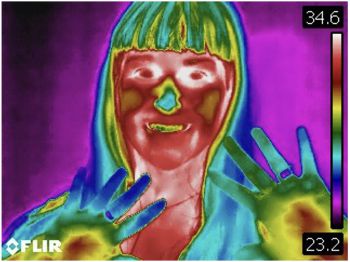New Study from Sussex: Your Nose Shows How Stressed You Are
By: Imogen Harris
Last updated: Monday, 13 October 2025

A thermal image of Prof Gillian Forrester during the study
New research from the University of Sussex shows that facial temperature – in particular, your nose – indicates how much stress an individual is experiencing. Under pressure, tests found that your nose temperature drops between three and six degrees, with the results clearly visible on a thermal imaging camera.
Lead researcher Prof Gillian Forrester, from the School of Psychology, conducted the research on 29 volunteers, and found that blood flow in the face is diverted to most essential sense organs, such as your ears and eyes. This dip usually recovers in a few minutes, once the stressful situation has resolved.
Speaking to the BBC, Prof Forrester said, "The length of time it takes someone to recover from this nasal dip could be an objective measure of how well somebody regulates their stress. If they bounce back unusually slowly, could that be a risk marker of anxiety or depression? Is it something that we can do anything about?"
In this BBC article, the journalist was put under pressure, with increasingly difficult mental arithmetic tasks and having to give an impromptu presentation in front of an extremely unfriendly panel.
This test could also be a useful way to assess individuals who cannot say how stressed they are feeling, such as babies and non-human primates.
The research originally looked at great apes, such as gorillas and chimpanzees, who all show the same stress response. Researcher Marianne Paisley said to the BBC, “They can't say how they're feeling, and they can be quite good at masking how they're feeling. "We've [studied] primates for the last 100 years or so to help us understand ourselves. Now we know so much about human mental health, so maybe we can use that and give back to them."
You can read the full article here: Mental arithmetic really stresses me out and science has proved it
This work supports the UN’s Sustainable Development Goals: SDG 3 (good health and wellbeing). You can read more about our work on the SDGs here.

